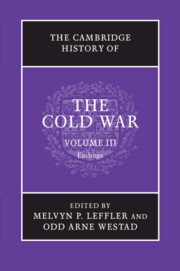Book contents
- Frontmatter
- 1 The Cold War and the intellectual history of the late twentieth century
- 2 The world economy and the Cold War, 1970–1990
- 3 The rise and fall of Eurocommunism
- 4 The Cold War and Jimmy Carter
- 5 Soviet foreign policy from détente to Gorbachev, 1975–1985
- 6 Islamism, the Iranian revolution, and the Soviet invasion of Afghanistan
- 7 The collapse of superpower détente, 1975–1980
- 8 Japan and the Cold War, 1960–1991
- 9 China and the Cold War after Mao
- 10 The Cold War in Central America, 1975–1991
- 11 The Cold War and southern Africa, 1976–1990
- 12 The Gorbachev revolution and the end of the Cold War
- 13 US foreign policy under Reagan and Bush
- 14 Western Europe and the end of the Cold War, 1979–1989
- 15 The East European revolutions of 1989
- 16 The unification of Germany, 1985–1991
- 17 The collapse of the Soviet Union, 1990–1991
- 18 Science, technology, and the Cold War
- 19 Transnational organizations and the Cold War
- 20 The biosphere and the Cold War
- 21 The Cold War and human rights
- 22 The Cold War in the longue durée: global migration, public health, and population control
- 23 Consumer capitalism and the end of the Cold War
- 24 An ‘incredibly swift transition’: reflections on the end of the Cold War
- 25 The restructuring of the international system after the Cold War
- Bibliographical essay
- Index
- References
23 - Consumer capitalism and the end of the Cold War
Published online by Cambridge University Press: 28 September 2010
- Frontmatter
- 1 The Cold War and the intellectual history of the late twentieth century
- 2 The world economy and the Cold War, 1970–1990
- 3 The rise and fall of Eurocommunism
- 4 The Cold War and Jimmy Carter
- 5 Soviet foreign policy from détente to Gorbachev, 1975–1985
- 6 Islamism, the Iranian revolution, and the Soviet invasion of Afghanistan
- 7 The collapse of superpower détente, 1975–1980
- 8 Japan and the Cold War, 1960–1991
- 9 China and the Cold War after Mao
- 10 The Cold War in Central America, 1975–1991
- 11 The Cold War and southern Africa, 1976–1990
- 12 The Gorbachev revolution and the end of the Cold War
- 13 US foreign policy under Reagan and Bush
- 14 Western Europe and the end of the Cold War, 1979–1989
- 15 The East European revolutions of 1989
- 16 The unification of Germany, 1985–1991
- 17 The collapse of the Soviet Union, 1990–1991
- 18 Science, technology, and the Cold War
- 19 Transnational organizations and the Cold War
- 20 The biosphere and the Cold War
- 21 The Cold War and human rights
- 22 The Cold War in the longue durée: global migration, public health, and population control
- 23 Consumer capitalism and the end of the Cold War
- 24 An ‘incredibly swift transition’: reflections on the end of the Cold War
- 25 The restructuring of the international system after the Cold War
- Bibliographical essay
- Index
- References
Summary
During the chaotic days of the Cold War’s end in East Germany and throughout Eastern Europe, capitalist-made consumer goods often seemed both the symbols and the substance of freedom. Throngs of East Germans helped hack down the Berlin Wall in November 1989 and made their way into West Berlin to enter the hallowed halls of the Kaufhaus des Westens. Media images of thousands of new shoppers, carrying coveted consumer products back to East Berlin, seemed to mark both the disintegration of Cold War barriers and the victory of capitalist mass consumerism.
Over the following months, image after image linked the rapid implosion of Soviet power to the triumph of consumerism. Pepsi rushed out a television advertisement that positioned its product amidst pictures of the crumbling Berlin Wall and strains of the “Hallelujah Chorus.” McDonald’s cranked out press releases boasting how East Europeans were developing a taste for American cuisine, and American exporters struggled to meet the demand for Western brassieres, nylon hosiery, lipsticks, and other symbols of what the Kremlin had once derided as consumerist decadence. Prague sprouted new signs reading “I am a billboard. I sell your products,” and Barbie became the prestige commodity for young girls. In a full-page advertisement in the New York Times of December 15, 1989, Playboy proclaimed itself to be “Exporting the American Dream” by becoming “the first American consumer magazine published in Hungarian.”
- Type
- Chapter
- Information
- The Cambridge History of the Cold War , pp. 489 - 512Publisher: Cambridge University PressPrint publication year: 2010
References
- 22
- Cited by

